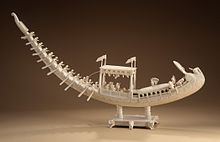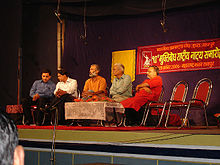Indian People's Theatre Association
| Part of a series on the |
| Culture of Bengal |
|---|
 |
| History |
| Cuisine |
Indian People’s Theatre Association (IPTA) was an association of leftist theatre-artists under the Left parties. Its goal was to bring cultural awakening among the people of India.[1] It was the cultural wing of the Communist Party of India.[2]
Beginning
Some of the initial members of the groups were Prithviraj Kapoor, Bijon Bhattacharya, Ritwik Ghatak, Utpal Dutt, Khwaja Ahmad Abbas, Salil Chowdhury, Pandit Ravi Shankar, Jyotirindra Moitra, Niranjan Singh Maan, S. Tera Singh Chan, Jagdish Faryadi, Khalili Faryadi, Rajendra Raghuvanshi Safdar Mir etc. The group was formed in 1942, in the background of the Second World War, with Bengal famine of 1943 and starvation deaths in India on the one hand and repression by the colonial masters in the wake of the Quit India Movement and the aggression by the fascist powers on the Soviet Union on the other. All India People's Theatre Conference was held in Mumbai in 1943 where the group presented its idea and objective of representing the crisis of the time through the medium of theatre and to help people understand their rights and duties. This conference led to the formation of committees of IPTA across India. The movement hit not only theatres, but also cinema and music in Indian languages.
Nabanna
The most important of the dramas were Nabanna (Harvest). Nabanna is a folk-cultural festival of Bengal to celebrate the harvest. This Bengali drama, written by Bijon Bhattacharya and directed by Sombhu Mitra, portrayed the evils of the Bengal famine of 1943 and the alleged indifference of the British rulers, as also of the richer strata of Indian society towards the plight of the millions dying from the famine.
Other dramas and films
Nava Jiboner Gaan (Song of New of Life) by Jyotirindra Moitra and the film Dharti Ke Lal (Children of the Earth) by Khwaja Ahmad Abbas followed Nabanna in addressing the needs of the people. These performances were characteristic for their vivid, stark portrayal of the suffering of the masses. Similar productions were carried out all over India, like Deshasathi in Marathi which was about the attack on the Soviet Union by Nazi Germany; Prarambham in Telugu; and Zubeida directed by Balraj Sahni and based on the story of a Muslim girl from Malabar. Manikuntala Sen, the fire band woman of left politics acted in this play along with Gopal Halder, who later became an educationist.

Breakage and legacy
The group were dispersed in 1947. However, the main members continued to carry the legacy of IPTA by forming several groups with similar ideology. Ahindra Chowdhuri, Sombhu Mitra and Tripti Mitra were the leading members of the group Bohurupee. Raktakarabi, Tahar Nam Ti Ranjana, Char Adhyay (written by Rabindranath Tagore) were some of the earlier productions of Bohurupee. Utpal Dutt led another faction of artists and went to create classics like Tiner Talowar and Kallol. IPTA Mumbai was another offshoot that has existed over the last six decades and continue to produce dramas till date.[3] IPTA offshoots exist in other parts of India as well.[4]
Group theaters like Nandikar, Spandan of Kolkata still produce their dramas often in the line of the IPTA movement, and recently there has been effort to start a similar movement inspired by the IPTA.[5]
The Delhi-based theatre company Jana Natya Manch, best known for its street theatre, also emerged from the IPTA in 1973. Noted film director, Ritwik Ghatak made a Bengali film, Komal Gandhar (1961) set around IPTA theatre group.
IPTA in West Bengal
At present IPTA West Bengal is a running organisation led by IPTA West Bengal State Committee. The Secretary is Sri Gora Ghosh, President Sri Sisir Sen, Asst. Secretary Sri Ashim Bandyopadhyay. There are many cultural personalities like Shakti Bandyopadhyay, Bablu Dasgupta, Pijus Sarkar, Kankan Bhattacharjee, Sankar Mukherjee, Hiranmoy Ghosal, Tapan Hazra, Basudeb Dasgupta, Suvendu Maity, Abhoy Dasgupta, Ratna Bhattacharjee etc. There are 19 District Committees under this organisation. No. of Artist members 7000 approx. IPTA W B has been reorganised in its 3rd conference held on 1967 at Kolkata Bagbazar reading room Library.
Hundreds of dramas have been produced still today since 1967. Such as Bis e June by Biru Mukhopadhyay, Bastav Sastra and Buno Hans by Hiren Bhattacharya, Haraner Nat Jamai by Sisir Sen, Spartakas and Fulwali by Basudeb Basu, Fatik chander Swapnaguli, Hanadaar, Judhistirer Narak Darsan, Haripadar Panja Larai (Street Drama) by Ashim Bandyopadhyay. Abelay Amritakatha, Jaban Bandi (Street Drama), Chhoto Bakulpurer jatri, Aaj O Itihaas, Tarapadar Maa, Ganpat Kahar, by Sudip Sarkar. Light House by jayanta Chakraborty. Ramdhanu, Aami Krishna, Virus, Ananta Yatra by Tapan Hazra etc.
IPTA in Raigarh, Chhattisgarh
IPTA Raigarh was established in 1982 during the first state conference of IPTA which was organized by the Raigarh unit in 1982. Since then Raigarh unit has been active and practicing theatre in this small district of Chhattisgarh (earlier Madhya Pradesh).
In 1994, when the Golden Jubilee of IPTA was celebrated nationwide, this unit decided to celebrate the Golden Jubilee by organizing a five-day theatre festival during the month of December. Although meant to be a one-off event, it was very well received and later on, it was decided to continue this as an annual event. This is how the National Theatre Festival was born and conceived.
The same year IPTA was reorganized and it spread its activities, started imparting training and updating artists by means of organizing theatre workshops every year for youth as well as for children. Since 1995, theatre stalwarts like Arun Pandey, Sanjay Upadhyay, Suman Kumar, Gautam Mazumdar, Devendra Raj Ankur, Ranjeet Kapoor, Akhilesh Khanna, Neeraj Wahal, Praveen Gunjan & Anjana Puri have conducted workshops and trained our artists.
Besides organizing theatre workshops and festivals, IPTA Raigarh started participating in various festivals to showcase their productions in different cities like Delhi, Allahabad, Jabalpur, Raipur, Aurangabad, Bhopal, Patna, Gaya, Sagar, Ratlam among the few.
In 2001, IPTA Raigarh registered itself as ‘IPTA Center for Cultural Resources and Training’ with the Registrar of firms & societies, Government of India.
“IPTA Center for cultural resources & training” has emerged as one of the pro-active theatre groups in Chhattisgarh State.
Artistes of the group, including child artistes, have acted in a film ”Chutakan Ki Mahabharat” produced by Children’s Film Society Of India and Directed by Sankalp Meshram, which won the National Award for the Best Children’s Film in 2005, conferred by the Government of India.
IPTA Raigarh also publishes its annual Magazine “Rankarm” which is endorsed by Kendriya Hindi Nideshalaya and is being distributed throughout the country with the help of the same. This magazine has been published annually since 2003.
IPTA in Punjab
The Indian People`s Theatre Association (IPTA) movement in Punjab greatly altered the theatre as it was reoriented toward playing a greater role as an instrument of social change. The IPTA movement in Punjab brought out artists like Shiela Bhatia, Balraj Sahni, Balwant Gargi, Niranjan Singh MaanTera Singh Chan, Joginder Bahrla, Pandit Khalili, the Theatre workers, Parkash Kaur, her younger sister Surinder Kaur, and Amarjit Gurdaspuri the famous folk singers in the service of people's concerns. They made serious efforts to take Punjabi theatre and folk culture to the masses.
See also
Further reading
- Theatre and Activism in the 1940s. Essay by Zohra Sehgal Crossing boundaries, by Geeti Sen. Orient Blackswan, 1998. ISBN 81-250-1341-5. pp 31-39.
Notes
- ^ Bengali Theatre and Performing Arts. Article in Bangla-online.info
- ^ Lisa Lowe; David Lloyd (27 October 1997). The Politics of Culture in the Shadow of Capital. Duke University Press. pp. 454–. ISBN 978-0-8223-2046-3. Retrieved 16 December 2012.
- ^ Indian People's Theatre Association. Article in mumbaitheatreguide.com
- ^ Suhrid Sankar Chattopadhyay. A stage for social commitment. Frontline. Volume 22, Issue 13, June18 - July01, 2005
- ^ Indian Peoples Theatre Association revival by Spandan
